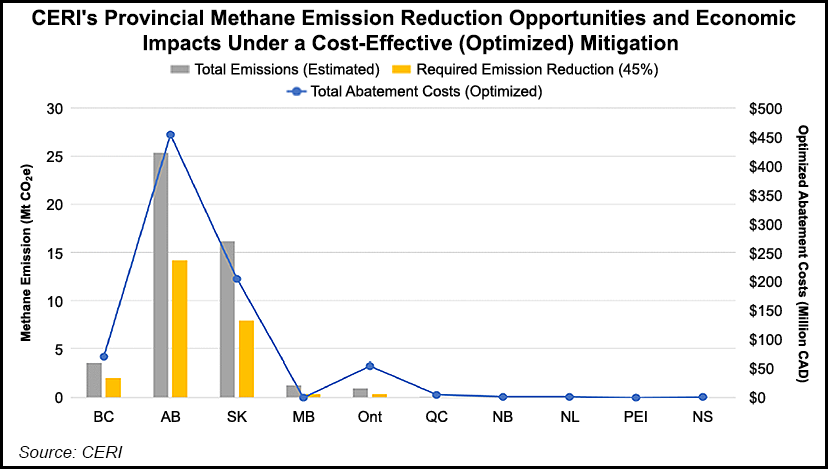E&P | NGI All News Access | Regulatory
Canadian Emissions Regulations Could Prove Costly for Oil, Gas Industry, Report Finds
Hitting Canadian targets for cutting methane emissions could cost natural gas and oil producers C$725 million ($544 million), according to new estimates by the Canadian Energy Research Institute (CERI).

CERI predicts that the cleanup could cost C$450 million ($338 million) in Alberta, C$205 million ($154 million) in Saskatchewan and C$70 million ($52 million) in British Columbia,.
The industry- and government-supported agency reviewed federal and provincial regulations that go into force Jan. 1, 2020.
The rules enact a 2016 agreement between the governments of Canada, Mexico and the United States. Methane was singled out for an emissions cut of 40-45% due to its rating as a greenhouse gas that’s far more potent than carbon dioxide.
The Canadian structure has enabled development of a flexible, cooperative cleanup regime that CERI calls “optimal.” The gas-producer provinces retain primary authority over the industry, with federal national regulation only applied if lapses open up gaps.
In Canada, production and field processing emit methane estimated to be equivalent to 46.5 million tons per year of carbon dioxide, or about 95% of the total attributed to natural gas flaring, venting and leaks. The emissions are only about 1.5% of output but stand out as a climate policy priority high on the greenhouse gas strength scale.
The evolving Canadian regulatory regime enables industry to focus on the most efficient counter-measures to the largest emissions sources, such as eliminating or replacing field hardware traditionally driven by gas flows from wells instead of compressed air.
An array of leak detection and prevention methods is under development by an industry group that includes government specialists and works on an array of environmental issues, the Petroleum Technology Alliance Canada (PTAC).
Strict, rigid forms of regulation would be far more expensive. CERI calculates costs of different approaches with an elaborate economics tool called the Integrated CH4 Emission Reduction Model (ICERM).
A “maximum” regime, patching every fugitive leak across the country, would cost up to C$5.3 billion ($4 billion), according to ICERM. A “uniform” rule, requiring emissions cuts of 40-45% from every source no matter how small, would cost up to C$2.8 billion ($2 billion), according to the economic modeling.
To keep the methane cleanup affordable, CERI says, “regulations will require the right blend of specificities and flexibilities that accommodate variability in the characteristics of emissions from different source categories, geographical regions and seasons of the year.”
© 2024 Natural Gas Intelligence. All rights reserved.
ISSN © 2577-9877 | ISSN © 2158-8023 |
